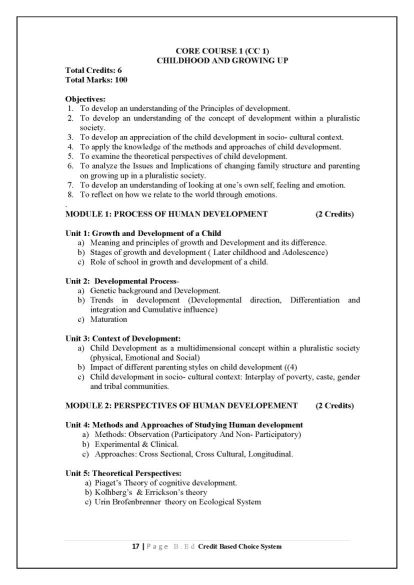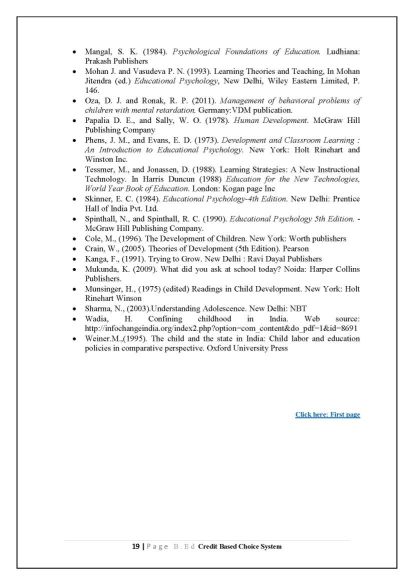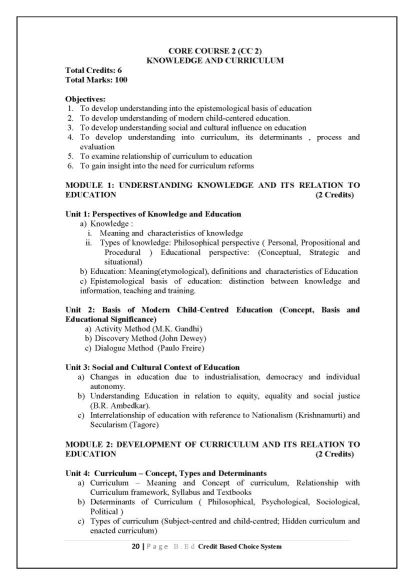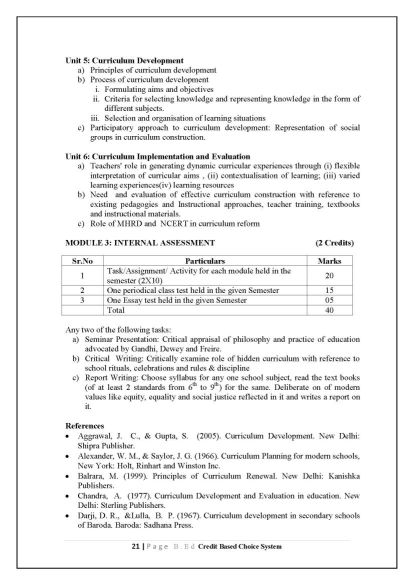| Re: Syllabus for B.Ed Exam of Mumbai University
University of Mumbai offers Bachelor of Education (B.Ed) of Duration One academic year as Credit Based Semester and Grading System comprising of two semesters.
Syllabus
Structure of the B.Ed syllabus will comprise of
‘Part A’: Theory – External Assessment and
‘Part B: Practicum – Internal Assessment as follows:-
Each student is required to opt for any one of the special fields listed below.
1. Action Research
2. Computers in Education
3. Education for Rural development
4. Environmental Education
5. Guidance and Counselling
6. Inclusive Education
SEMESTER I
COURSE I :Philosophical
Foundation of Education
COURSE II: Psychology of the
Learner
COURSE III: Educational Evaluation
COURSE IV: Information and
Communication
Technology in
Education
SEMESTER II
COURSE V: Sociological
Foundation of Education
COURSE VI : Psychology of the
Learning
COURSE VII: Educational
Management
COURSE VIII: Special fields : (Any
one of the following)
1. Action Research
2. Education for Rural
Development
3. Environmental Education
4. Guidance and Counselling
5. International Education
6. Inclusive Education
7. Computers in Education
For complete syllabus here is the PDF file
SEMESTER I
COURSE—I
PHILOSOPHICAL FOUNDATION OF EDUCATION
OBJECTIVES:
1. To develop an understanding of the relationship between philosophy and
education..
2. To develop an understanding of the contribution of Indian and Western
philosophers.
3. To create an awareness of the goals and provisions in the Indian constitution.
4. To develop an understanding of the basis of curriculum designing.
5. To develop an awareness of professional ethics and multifaceted role of
teacher.
UNIT I: PHILOSOPHY AND EDUCATION
(14 Lectures)
a) Meaning and Nature of Philosophy.
b) Meaning of education (Education as acquisition, manifestation and
transaction) and Characteristics.
c) Scope - Disciplines, Areas and Forms of Education.
d) Relationship between Philosophy and Education.
e) Functions of Education in present context- Individual and National
(economic, social, political and cultural).
UNIT II: IMPACF OF PHILOSOPHY ON EDUCATION
(10 Lectures)
a) The impact of Idealism, Naturalism, Pragmatism and Realism on
Education with reference to Aims, Curriculum, Methodology,
Textbooks, Discipline and Role of the Teacher.
b) Educational Contributions of following Indian and Western
Thinkers with its Implications.
i. Mahatma Gandhi
ii. Swami Vivekananda
iii. Rabindranath Tagore
iv. Jean J. Rousseau
v. John Dewey
UNIT III: -DEVELOPMENT OF GOALS OF EDUCATION IN INDIA.
(10 Lectures)
a) Ancient Indian Goals: Purusharthas.
b) Indian Constitution and the status of education with
reference to the following:
i. Universalisation of Education. Article: Directive
Principles: 41, 45, 46
ii. Equality of Opportunities in Education. Article 28, 29,
350, 351
iii. Education and Fundamental Rights and Duties.
Article 14, 15, 16, 30 & Duties: 51A(a to h) .
c) National Policy on Education (NPE —1986)
d) Sarva Shiksha Abhiyan (SSA - 2000) (Features, Aims
and Objectives)
e) National Curricular Framework-2 005 (Need and
Objectives)
UNIT IV: TEACHING AS A PROFESSION
(4 Lectures)
a) Principles of Professional Ethics
b) Purpose of Teachers’ Organizations
UNIT V: CURRICULUM
(4 Lectures)
a) Concept, Principles and Determinants of Curriculum Design.
b) Integrated Curriculum.
REFERENCES
1. Brubacher, John S Philosophy Of Higher Education San
Francisco, jossey — Ban 1978
2. Brubacher, John S Modem Philosophies of Education, McGraw-Hill
Book Company Inc. New York, 1962.
3. Brubacher, John S Eclectic Philosophy of Education, Prentice
Hall, Engeliwood Cliffs, New Jercy, 1962.
4. Kilpatrick, WH Source Book in the Philosophy of Education,
McMillan and Company. New York, 1934.
5. Mayer, F Foundations of Education, Charles E Merril Books
Inc., Ohio, 1963.
6. Anand, C L (1993) Teacher and Education in the Emerging Indian
Society, New Delhi:
NCERT.
7. Coombs, Philips H., (1985), the World Crisis in Education, New
York: Oxford University Press.
8. Delors, Jacques (1996) learning the Treasure within, UNESCO:
Report to UNESCO of the International Commission on Education for
Twenty first Century.
9. Kar, N. K.: Value Education - A Philosophical Study, Ambala, The
Associated Publication, 1996.
10. Aggrawa), J. C.:Basic idea’s in Education, Delhi, Shipra Publications,
2001.
11. Panday, R S. :An Introduction to Major Philosophers of
Education, Agra, Vinod Pusatak Mandir.
12. Passi, B. K. :Value Education, Agra, National Psychological
Corporation, 2004
13. Dhavan,M. L. : Philosophy of Education, Delhi, Editor, Isha
Books 2005
14. Panday, V. C.: Value Education and Education for Human
Rights, Editor, Delhi, Isha Books 2005.
15. Singh, M.S.: Value Education, Delhi, Adhyayan, publication and
Distribution, 2007.
16. Somnath Agrawal, Philosophical foundation of Education.
Authors Press,2007
17. Shankar Mukharji, Contempory issues in Modern Indian
education, Authors Press, 2007
18. Saiyidain, K. G. (1970), Facts of Indian Education, New Delhi:
NCERT.
19. Ross, James (1962), Groundwork of Educational Theory, London:
George Harre and Sons.
20. Mohanti, J. (1987), Democracy and Education in India, New
Delhi: Deep and Deep Publishers.
21. Tyagi, P. N. (1991), Education for All: A graphic Presentation,
New Delhi: NTEPA.
22. Govt. of India (1993), Education for All: The Indian Scene,
Widentry Horizons, New Delhi: MHRD.
23. Nayar, P. It, Dave, P.N., and flora, K. (1982% Teacher and
Education in Emerging Indian Society, New Delhi.
24. Ram Murti Acharya (1990), Towards an Enlightened and Humane
Society - A Committee Report; New Delhi MHRD.
25. Ruhela, S. P. (1969), Social Determinants of Educability in India,
New Delhi: Jam Publishers.
26. Srimali, K. L. (1970),The Prospects for Democracy in India,
Southern Illinois: University Press.
27. Bhatacharya and Sriniwas 0971), Society and Education, Calcutta:
Academic Publishers.
28. Durkhiem, Emile (1956), Education and Sociology, New York: Free
Press.
29. Singh, Karan; Perspectives on the constitution
30. Yadulal, Kusum; Perspectives of educational CHANGES
31. Venkateshwaran; Principles of Education.
32. Shanna, Ramnath (2000), Textbook of educational philosophy, New
Delhi: Kanishka publ.
33. Aggrawal, J.C (1996), 10th rev. ed. Theory and principles of
education, New Delhi, Vikas publication.
34. Raheja, S.P. Human values and education
35. Aggarwal, Somnath Philosophical Foundations of Education
36. Kashyap, Subbash (1993), Perspectives on the constitution Delhi,
Shipra publ.
SEMESTER I
COURSE-II
PSYCHOLOGY OF THE LEARNER
OBJECTIVES:
1. To develop an understanding of the nature, scope and methods of
Educational Psychology
2. To acquire knowledge of the characteristics of growth and development at
various stages
3. To create an awareness of the problems of adolescents.
4. To develop an understanding of the various theories of intelligence and the
role of the teacher in fostering intelligence and creativity.
5. To develop an understanding of the concept of individual differences and its
implications
6. To develop an appreciation of the concept, need and strategies for inclusion in
schools.
7. To develop an understanding of the concept of Personality and the role of the
teacher in promoting mental health of students.
UNIT I: EDUCATIONAL PSYCHOLOGY
(7 Lectures)
a) Meaning, Nature, Scope and relevance of Educational Psychology.
b) Methods of Educational Psychology.
i) Introspection
ii) Observation
iii) Experimental
UNIT II: UNDERSTANDING THE DEVELOPMENT OF THE LEARNER
(9 Lectures)
a) Concept and Principles of Growth and Development.
b) Theories of Development and their Educational Implications.
i) Piaget’s theory of Cognitive Development
ii) Kohlberg’s theory of Moral development.
iii) Erikson’s theory of Psychosocial Development
c) Developmental Cbaracteristics of ‘Adolescence’ with reference to Physical,
Cognitive, Emotional & Social aspects
d) Current Issues related to Adolescent Stress and Role of the Teacher -
(Increasing loneliness, changing family structures, rising permissiveness,
Peer pressure, substance abuse, materialism, depression and suicide,
Information overload, early exposure of adult issues through
media/Internet)
UNIT III: INTELLIGENCE & CREATIVITY
(12 Lectures)
a) Nature of Intelligence
b) Theories of Intelligence
i) J.P. Guilford’s Structure of intellect
ii) Gardner’s theory of Multiple Intelligence.
iii) Goleman’s theory of Emotional Intelligence.
c) Creativity:
i) Meaning of Creativity and Identification of Creative Learner.
ii) Process of Creativity. iii) Teacher’s role in fostering
Creativity.
UNIT IV: LEARNER DIVERSITY
(5 Lectures)
a) Concept of Individual Differences.
b) Concept and need for Inclusive Education
c) Understanding Exceptional learners
i) Gifted
ii) Slow Learners.
d) Concept of Learning Disability (LD)
e) Special Educational Needs:
i) Dyslexia
ii) Dysgraphia
iii) Dyscalculia
UNIT V: PERSONALITY
(9 Lectures)
a) Concept of Personality and Self Concept.
b) Types of Conflicts and Defense Mechanisms (Escape- regression, daydreaming,
Denial rationalization, projection, repression and Substitutionsublimation,
displacement and compensation)
c) Mental Health: Concept and Importance.
d) Role of Education in preventing Maladjustment
SUGGESTED ACTIVITY
1. Conduct a Case study of a secondary school student
REFERENCES:
1. Aggarwal JC: Essential Of Educational Psychology
2. B R Hergenhahn: An Introduction to Theories of Learning
3. Chattejee Saroj: Advanced Educational psychology
4. Chauhan SS: Advanced Educational Psychology
5. Dandekar W N: Fundamentals of Experimental Psychology
6. Dandpani S: A text book of Advanced Educational Psychology
7. Edward E Smith: Cognitive Psychology
8. Raison Kenneth; Eller Ben F: Educational Psychology for effective
teaching
9. Janda L H & Kllenke H K E: Psychology its study and Uses
10. Lefrancois Guy R: Psychology for teaching
11. Lefrancois Guy R: Theories of Human Learning
12. Mangal S K: Advanced Educational Psychology
13. Mathur S S: Educational Psychology
14. S K Mangal: Essentials of Educational Psychology
15. S. K Mangal: Advanced Educational Psychology
16. Walia J S: Foundations of Educational Psychology
Contact Details:
University of Mumbai
CST Road, Kalina, Santacruz East,
Mumbai, Maharashtra 400098
022 2654 3000
Map location:
[MAP]University of Mumbai[/MAP]
|




